Ronnie Wood Interview on His Steps Before Joining the Rolling Stones
by Jeff TamarkinIt’s always interesting to look back at the Rolling Stones‘ blues roots in the early 1960s. Everyone knows about the group’s origins—how Mick Jagger, Keith Richards, Brian Jones, Charlie Watts and Bill Wyman got together to express their love for American blues—but what of Ronnie Wood?
The guitarist, who joined the classic rock megastars in 1975, not surprisingly had similar roots—blues, R&B, early rock and roll and some jazz. Long before he joined the Stones—in fact, long before he joined the Jeff Beck Group and Faces, both of which included Rod Stewart on vocals and kept him busy before the Stones called—he was in a London Mod band called the Birds that traversed the same musical territory as his future bandmates.
In 2015, Wood discovered and published a journal—which he called How Can It Be? A Rock & Roll Diary (Genesis Publications)—that he kept as a teen in 1965 during the Birds’ short run. Upon its publication, Best Classic Bands’ editor spoke with the longtime Stones guitarist, born on June 1, 1947, about his ornithological roots, his dream to join the Stones a decade before he actually did, and more.
Best Classic Bands: How did you find your long-lost diary from 1965?
Ronnie Wood: It was quite a surprise. My brothers, who were eight and 10 years older than me and are no longer with us, found it when my mother died in the first house we had. She moved further up the road and amongst the stuff of mine that she kept we found this little treasure, along with some artwork that I did around the same time. Some of it had been pillaged and stolen but some other bits survived, which is great.
Reading some of the entries, it was all still so innocent in 1965.
RW: Yeah, but then again, the workload is still very similar. In fact, I have it easier these days.
You drew guitars in the diary. Were you always a gear fanatic?
RW: Yeah, it was great as soon as I could afford an amp of my own. For the first few years we used to put two guitars and vocals through one amp, and the bass player had his own amp. That’s why we let him join the band. [laughs] But as soon as I could afford my own I started to go to Jim Marshall’s [musical equipment] shop. I’d run across people like Pete Townshend in there and we’d have a hilarious friendly rivalry going to see who could get the biggest stack.
Was there a rivalry among the bands too, or more of a camaraderie?
RW: A camaraderie, really. The Birds never really had any hit records so they [fellow musicians in bigger bands] used to take me under their wing and give me encouragement: “Keep it up, you’ll get there one day.” We used to meet socially a lot in London a little club called Blazes. You can find different references to the different places we used to meet up, but I used to be friends with Eric Clapton and Jimi Hendrix. Mitch Mitchell of his band would come over and stay at my house once in a while. I was always a good friend of Keith Moon.
What will people find out about you from reading this book?
RW: They’ll discover a lot of things about me, like I am finding out. Reading that was like, wow, did I do that?
Did you know the Rolling Stones yet in 1965?
RW: I was aware of them and wanted to be in that band. It was soon after that Mick rang me up one day and asked me to be part of this session he was producing. We became friends but like ships passing in the night. I could see he had his eye on me, and I always had my eye on the band. I watched them go through their various stages.
You’ve said that even then you knew you would eventually join the Stones.
RW: I felt very close to them musically and image-wise and that’s where I wanted to be. I knew that every band that I was in was just another steppingstone toward being in that band. I just knew in the back of my mind that some day it would come around, and sure enough, it did. But it was just being in the right place at the right time. It was a lot of fate and a lot of nice things just falling into place.
What happened to the Birds when the American group the Byrds became famous in ’65?
RW: Our manager at the time, Leo de Clerck, he jumped in and saw the ideal opportunity for a lawsuit, so when they came to England he issued a writ on the tarmac at the airport for them stealing our name. It gave us the front page of the big music paper over here at the time, the Melody Maker. It was Birds vs. Byrds and it was like, wow, we’ve made the big time! We did it the hard way.
Listen to “Leaving Here” by Ronnie Wood’s early band the Birds
How was your guitar playing in 1965, two years before you joined the Jeff Beck Group?
RW: It was all a learning curve, doing my apprenticeship. Coming up I was heavily influenced by the American imports that only a few people had. I used to be lucky enough to have this guy in Savile Row called Franklin Boyd. He had the Motown imports and I discovered Holland-Dozier-Holland and Marvin Gaye and some early recordings that the Birds first covered. Like “Leaving Here,” which was done by Eddie Holland, and “No Good Without You,” a beautiful song by Marvin Gaye. At the same time I had my ear to bands like the Impressions and we mixed that with Chuck Berry, Buddy Holly and the Crickets, the Everly Brothers and lots of influences from my brothers in R&B and jazz from my brother Ted—he was a jazzer. I was exposed to people like Paul Whiteman and his Orchestra and Bix Beiderbecke and Louis Armstrong. Then there was Muddy Waters and Howlin’ Wolf, Jimmy Reed, a little bit of Fats Domino, Jerry Lee Lewis. It was a big melting pot and I used to pick the ones that felt closest to me and I learned everything by ear from the records.
What were your first American gigs with Jeff Beck like?
RW: It was fantastic! It was further adventures and getting nearer to being in the Stones. When the Jeff Beck Group started to crumble, Rod [Stewart] and I loved the Small Faces and then [their singer] Steve Marriott left so I rang up [bassist] Ronnie Lane and that was my next step up the ladder.
Watch Stewart and Wood perform at the first of two Jeff Beck tribute concerts in 2023
How did the evolution of the technology of the day affect your playing?
RW: I’d reached the saturation point on guitar with the Birds so when I got together with Jeff Beck, he asked me if I wouldn’t mind playing bass, and I welcomed the idea because it gave me a new revitalized energy to go back to guitar with the Faces [after leaving Beck]. I came in with a Duane Allman kind of slide guitar and the influence of Steve Cropper and the Meters, still keeping my Buddy Guy blues influence.
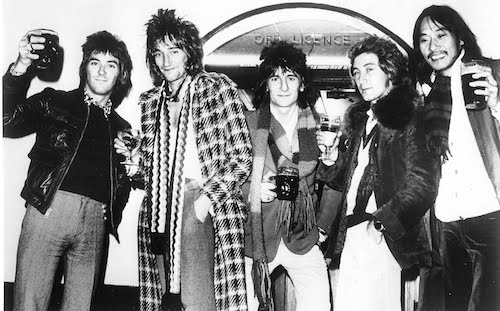
Faces publicity photo from the mid-’70s. Left to right: Ian McLagan, Rod Stewart, Ronnie Wood, Kenney Jones, Tetsu Yamauchi
Is a Faces reunion still possible with Ronnie Lane and Ian McLagan gone?
RW: I got together with Rod at his 70th with [drummer] Kenney Jones and we played “Stay With Me” and “Sweet Little Rock and Roller” and we had renewed energy about perhaps getting together. It’s just a matter of fitting it in between my Stones commitments and my art commitment.
Related: Faces did reunite, for one brief gig in 2015
You recently celebrated your 40th year with the Stones and some people still call you the “new guy” in the band.
RW: Oh, yeah! It went on for 17 years [not being considered a full legal member] before I finally got on an even keel financially with the others, as well as everything else. But I didn’t mind because I was always younger so I thought, well, my time will come, and sure enough it finally did. But it’s always been like that—I’ve always been little Ronnie behind everyone. But it’s cool.
Watch the video the Stones produced for the new guy
Do you listen to new music? Anyone in particular that you like?
RW: I keep my ears open but it’s hard. I love Regina Spektor. Kings of Leon do some good stuff. Jack White is always doing different things.
What’s the most important thing you’ve learned during your career?
RW: I’ve learned never to stop experimenting. Never take anything as written in stone. You’ve always got to be mindful of what you’re putting out, to keep the people pleased.
Related: Former Stones bassist Bill Wyman speaks with radio legend Dennis Elsas
How do you spend your time off from playing?
RW: I’m still painting.
Do you think you will ever record another solo album?
RW: I’ve got material. It’s just a matter of finding the time.

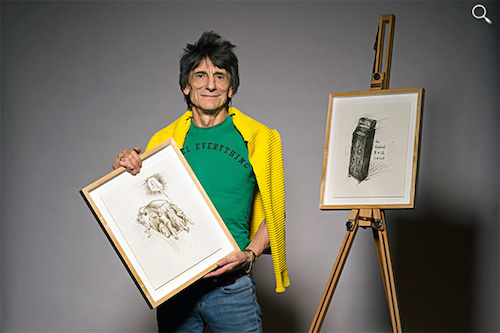
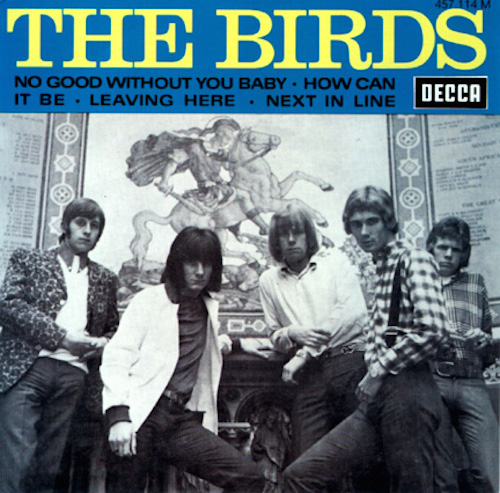

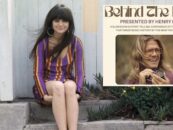
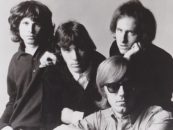
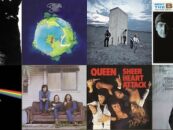
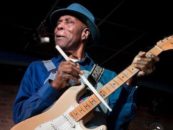

1 Comment so far
Jump into a conversationThe ads for Ron Wood’s first solo LP in the 1970s had the tag line “The Great Stone Face” which I thought was awfully clever.